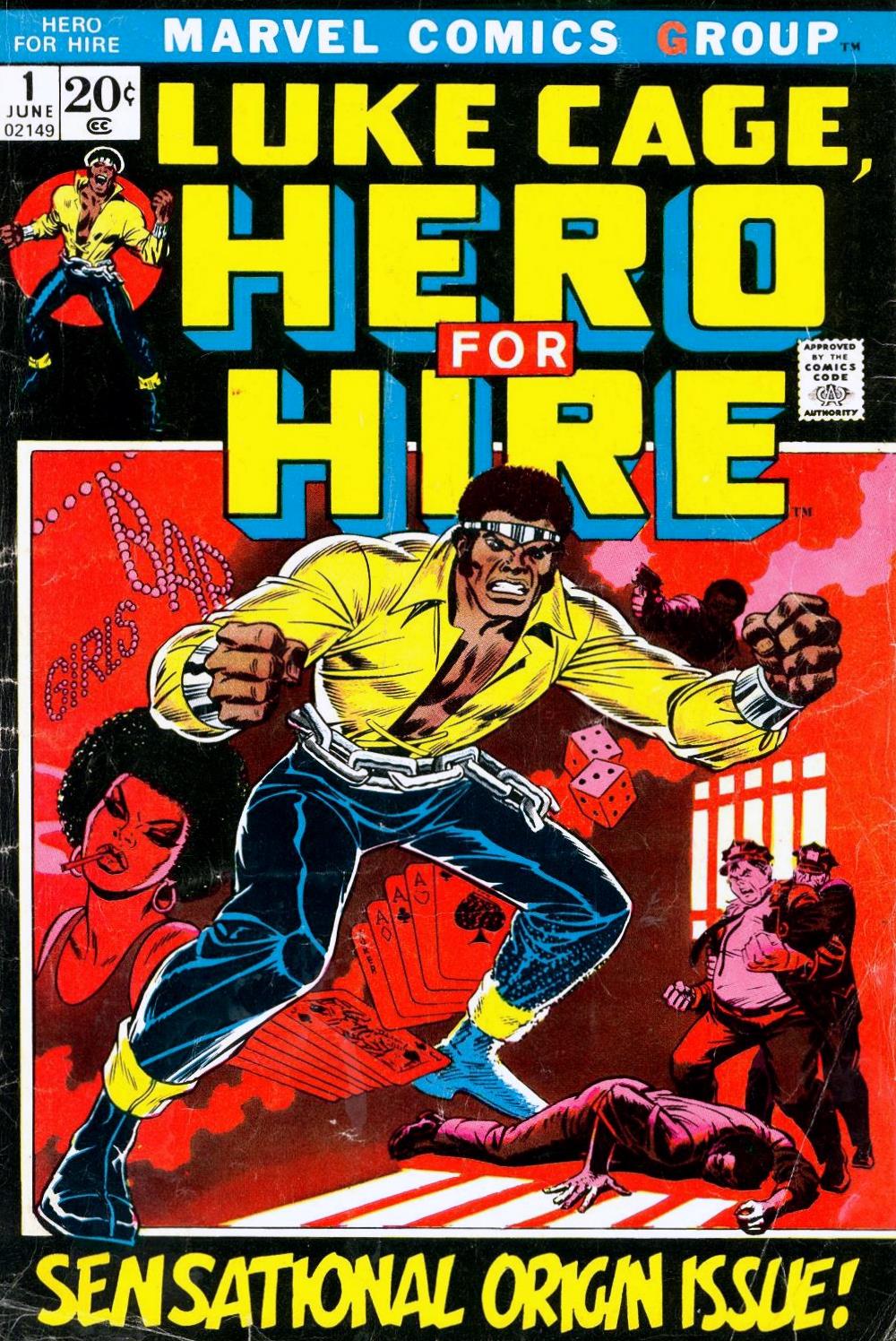Currently, blockbuster movies are taking a lot of their cues and subject matter from comic books, but in the 1970s, it was the other way around.
Having put most of their romance and western comics out to (ahem) pasture, and after establishing their newer, modern superhero characters in a shared universe, Marvel Comics was looking for new ground. The first place they looked for inspiration was the movie screen.
Movies like The Omen and The Exorcist prompted a greater pop culture interest in the occult and Satanism, spawning comics like Ghost Rider, Son of Satan, Tomb of Dracula and Werewolf by Night. Kung-fu flicks were the motivation behind Iron Fist and Shang Chi: Master of Kung Fu. Eventually, the wheel stopped on blaxploitation, and Luke Cage, Hero for Hire was born.
A man convicted for a crime he didn't commit, experimented on behind bars and who emerged from captivity with tremendous strength and bulletproof skin.
Despite having pretty much the same origin and power set, Netflix's Luke Cage (as played by Mike Colter) bears little visual resemblance to that character (even though the showrunners carefully work in a great reference to his original look during his origin flashback!).
In the comics, Luke Cage has gone from being the brash, confrontational fellow whose loud facade concealed a thoughtful and calculating man, to a quieter, more self-assured one who doesn't raise his voice too often because he doesn't have to. Colter's Cage is cut from the same cloth.
I mentioned how impressed I was with Mike Colter's casting in Jessica Jones, and he brings the same reflective intensity to his star turn here. Showrunner Cheo Hodari Coker and his writers have not only brought Marvel's first black superhero to the screen in a big, big way, but they have also given us the fundamentally most decent person to star in a Netflix show yet.
It's a bit of an unfair comparison: Jessica Jones didn't ask be to doubly traumatized, first by her origin and then later by her captivity under the mind control of Killgrave. The plot of Daredevil often seems to rely on Matt Murdock making bad decisions and alienating those closest to him, just like in the comics. Luke Cage is a superpowered hip-hop western, about a reluctant fighter looking for peace. Later on, when he finds himself having to fight more often, it is clear that he will not kill anyone, even though he has the means.
We meet Luke Cage working in Pop's Barbershop, sweeping hair and supplying towels, being paid under the table. Not glamorous, but he's happy to help Pop provide an oasis of sanity in Harlem, a salon and meeting place where youngbloods play videogames in the back, while men play chess and talk basketball up front. The sign on the wall says profanity is NOT allowed, and offenders pay their levies to the swear jar, a battered coffee can on the shelf.
Later on we see that this easygoing social hub is Pop's real mission: a chance for young men to see grown ups working, in uniform, taking pride in themselves.
The blackness of the show is prevalent, without being offputting. The majority of both crew and characters are people of color. Harlem, in all its glory and tragedy, emerges as a character in its own right: inspiring, revealing, and concealing in turn. Every place with a name brings a layer of meaning: Martin Luther King, Crispus Attucks, Jackie Robinson.
This undercurrent of self-improvement and empowerment is the foundation that Luke Cage is built on. Later on, a former ball player laments that he learned the game from his father, and now, no young black men want to play, because the fathers are all gone; bitter stuff.
Others are content to build their progress on the backs of others, like club owner and ganglord Cornell "Cottonmouth" Stokes and his cousin, city councilwoman Mariah Dillard.
Meanwhile, Mariah Dillard preaches about the Harlem renaissance and the rich, black history of the neighbourhood, pulling funds for an ambitious real estate development from her unscrupulous cousin while telling him she doesn't want to know where they came from. Alfre Woodard brings the same charm and intensity but in inverse proportions and aspect, to amazing effect.
From a comic book perspective, Luke Cage is a bit of a slow boil, with only a little action to begin with, and a main character unwilling to reveal his abilities. Eventually he gets there, but the journey here, at least in the arc that covers the first 6 episodes like a mini-season, is a lot less about defeating the villain, and coming to grips with oneself.
The opening credit sequence is Luke Cage in a microcosm: a punch that takes almost a minute to reach its target, while landmarks and street signs from Harlem illuminate the back and arms of the man punching. The funky breakbeat and guitar give way to the soaring strings from scores like Shaft and Rocky, and horns finish the build as the fist finally reaches its target and debris falls away to reveal the eponymous title. Oh, and let the record state that the moment they release a soundtrack for this show, featuring its hip-hop score and source music with a pinch of jazz, I will be getting it.
I'm 8 episodes in, believe that most high schools would benefit from showing Luke Cage every February, and cannot wait to see how it all turns out, and how it will tie into the next chapters of the Marvel Cinematic Universe on Netflix, Iron Fist and The Defenders.


Great review, Stephen. I'm looking forward to screening this, if I can ever convince Sylvia to come down so I can watch Daredevil Season 2 first. :-P
ReplyDelete